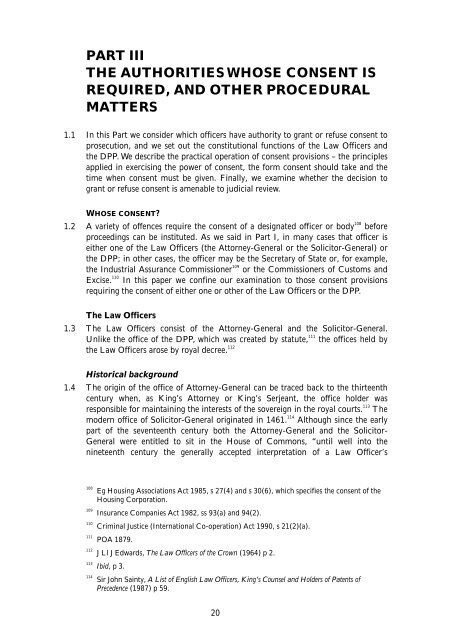cp149 Consents to Prosecution consultation - Law Commission
cp149 Consents to Prosecution consultation - Law Commission
cp149 Consents to Prosecution consultation - Law Commission
You also want an ePaper? Increase the reach of your titles
YUMPU automatically turns print PDFs into web optimized ePapers that Google loves.
PART III<br />
THE AUTHORITIES WHOSE CONSENT IS<br />
REQUIRED, AND OTHER PROCEDURAL<br />
MATTERS<br />
1.1 In this Part we consider which officers have authority <strong>to</strong> grant or refuse consent <strong>to</strong><br />
prosecution, and we set out the constitutional functions of the <strong>Law</strong> Officers and<br />
the DPP. We describe the practical operation of consent provisions – the principles<br />
applied in exercising the power of consent, the form consent should take and the<br />
time when consent must be given. Finally, we examine whether the decision <strong>to</strong><br />
grant or refuse consent is amenable <strong>to</strong> judicial review.<br />
WHOSE CONSENT?<br />
1.2 A variety of offences require the consent of a designated officer or body 108<br />
before<br />
proceedings can be instituted. As we said in Part I, in many cases that officer is<br />
either one of the <strong>Law</strong> Officers (the At<strong>to</strong>rney-General or the Solici<strong>to</strong>r-General) or<br />
the DPP; in other cases, the officer may be the Secretary of State or, for example,<br />
the Industrial Assurance <strong>Commission</strong>er 109<br />
or the <strong>Commission</strong>ers of Cus<strong>to</strong>ms and<br />
Excise. 110<br />
In this paper we confine our examination <strong>to</strong> those consent provisions<br />
requiring the consent of either one or other of the <strong>Law</strong> Officers or the DPP.<br />
The <strong>Law</strong> Officers<br />
1.3 The <strong>Law</strong> Officers consist of the At<strong>to</strong>rney-General and the Solici<strong>to</strong>r-General.<br />
Unlike the office of the DPP, which was created by statute, 111<br />
the offices held by<br />
the <strong>Law</strong> Officers arose by royal decree. 112<br />
His<strong>to</strong>rical background<br />
1.4 The origin of the office of At<strong>to</strong>rney-General can be traced back <strong>to</strong> the thirteenth<br />
century when, as King’s At<strong>to</strong>rney or King’s Serjeant, the office holder was<br />
responsible for maintaining the interests of the sovereign in the royal courts. 113<br />
The<br />
modern office of Solici<strong>to</strong>r-General originated in 1461. 114<br />
Although since the early<br />
part of the seventeenth century both the At<strong>to</strong>rney-General and the Solici<strong>to</strong>r-<br />
General were entitled <strong>to</strong> sit in the House of Commons, “until well in<strong>to</strong> the<br />
nineteenth century the generally accepted interpretation of a <strong>Law</strong> Officer’s<br />
108 Eg Housing Associations Act 1985, s 27(4) and s 30(6), which specifies the consent of the<br />
Housing Corporation.<br />
109 Insurance Companies Act 1982, ss 93(a) and 94(2).<br />
110 Criminal Justice (International Co-operation) Act 1990, s 21(2)(a).<br />
111 POA 1879.<br />
112 J Ll J Edwards, The <strong>Law</strong> Officers of the Crown (1964) p 2.<br />
113 Ibid, p 3.<br />
114 Sir John Sainty, A List of English <strong>Law</strong> Officers, King’s Counsel and Holders of Patents of<br />
Precedence (1987) p 59.<br />
20
















